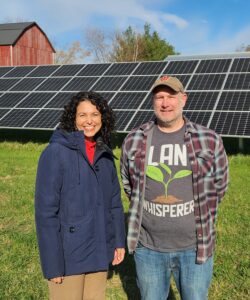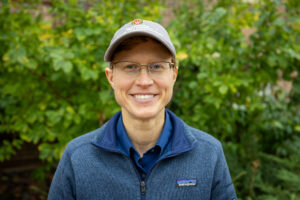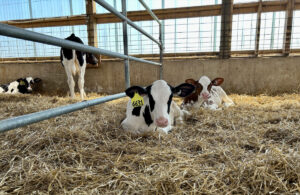September’s Average Ag Prices Released
On average, Wisconsin farmers got $5.07 per bushel of corn in September. This is 56 cents below the August price and and $2.05 below September 2022. That is according to the latest USDA, National Agricultural Statistics Service – Agricultural Prices report.
Wisconsin farmers averaged $13.70 per bushel for soybeans. This was 60 cents below the August price and 40 cents below the September 2022 price.
The September average oat price per bushel, at $3.82, was 10 cents above August but 71 cents below September 2022.
All hay prices in Wisconsin averaged $158.00 per ton in September. This was $26.00 above the August price and $9.00 above the September 2022 price. The September 2023 alfalfa hay price, at $174.00, was $30.00 above the previous month and $13.00 above September 2022. The average price received for other hay during September was $113.00 per ton. This was $13.00 above the August price and $17.00 above September last year.
The Wisconsin all milk price for September 2023 was $19.80 per cwt, 60 cents above the August price but $2.50 below September 2022. Prices received for milk cows for dairy herd replacement averaged $1,990 per head as of October 1, 2023.
Ag Rescues Present Unique Challenges
It’s not uncommon to come across a slow-moving tractor or harvester that’s slowing up traffic this time of year. The frustration you may have of being stuck behind them when you’re in a hurry can lead to being impatient and, in some cases, reckless behavior.
The question arises: is there really a problem with this situation? The simple answer is yes. In today’s fast-paced world, everyone seems to be in a hurry to get from point A to point B as quickly as possible. A slow-moving tractor or a wide piece of farming equipment can often be perceived as an obstacle, causing frustration and impulsive decisions on the road.
Jerry Minor, Pittsville Fire Chief says, “The consequences of such impatience can be catastrophic. Accidents involving farming equipment on the roadway are no minor affairs. The impact can be severe, causing extensive injuries to those involved. While the occupants of a car might walk away with injuries, the operator of the farming equipment may not be as fortunate. In some cases, the results can be tragic, with someone getting seriously hurt or worse.”
One of the main issues when sharing the road with farming equipment is the size and weight of these machines. Harvesting equipment, tractors, and other implements are massive in size, designed to efficiently move large quantities of agricultural products. They have as much right to use public roadways as any other vehicle. Farming equipment operators must navigate these roads to transport their goods from field to field, and they should be given the space and respect they deserve.
However, some road users make risky decisions, such as passing double yellow lines, which is a serious violation. Minor says that even an ambulance can’t pass on a double yellow, so you shouldn’t either.
Another factor to consider is the load that these farming vehicles carry. Farmers often do not have the luxury of weighing their loads before heading out of the field. They are under pressure to move as much product as possible, based on the limited time available. This means that the edges of the roads, already softened by rain, are susceptible to being damaged. Forcing a farmer to pull too far to the right to allow other vehicles to pass can lead to accidents.
“Safety is not just the responsibility of farmers; it’s a shared commitment,” explains Minor. “When an accident involving farming equipment occurs, the response from local emergency services is crucial. Fire departments, EMS, and other responders must be trained to handle the unique challenges that farm accidents present.”
While no one can anticipate every possible scenario, the principles of safety and efficient response remain the same. Farm accidents have a ripple effect that extends beyond the immediate incident. The downtime for farming equipment, the potential loss of a farmer’s life, and the impact on local communities are all interconnected. Just as with any industry, farming accidents require a specialized approach that accounts for the unique variables at play.
Dairy Strong Has New Location For 2024
Hall of Famer Cal Ripken Jr., baseball’s “Iron Man” who holds the record for most consecutive games played, will be among the featured speakers at Dairy Strong.

The Dairy Business Association announced the full slate of speakers for its largest annual event, which will be held Jan. 16-18 at the KI Center in Green Bay, Wis. In addition to the conference, the event will feature off-site tours and an opening social gathering hosted at Lambeau Field. The theme this year is “Growing stronger through sustainability.”
Dairy Strong attendees will unlock the potential of sustainable farming practices and discover how they can transform their businesses. They will gain practical knowledge and motivation to implement practices that will make a positive impact on the environment and their business.
“We always strive to make Dairy Strong a value for those attending through engaging programs and presenters,” DBA President Lee Kinnard said. “This year, we are excited for a new location and format to provide an even richer experience.”
In addition to Ripken, featured speakers will include Dr. Thomas Barnett, geopolitical strategist, and Scott Caine, President of Aimpoint Research. Caine will unveil Aimpoint’s Farmer of the Future 2.0 research. The research shows a snapshot of how farmers are adapting to a post-pandemic world.
The conference will again feature an Innovation Stage and breakout sessions on sustainability, policy, business and more. The Wisconsin Master Cheesemakers Reception will also be back, and DBA will announce their 2023 Advocate of the Year at dinner on Jan. 17.
Click here to view the conference’s agenda. Registration is open here. Journalists interested in attending can contact Laura Hensley at lhensley@dairyforward.com.
Diesel Prices Up Because Of Supply-Demand Pinch
Why are diesel prices high? Diesel prices are elevated this year for a couple of reasons. One is that there are still lingering impacts from the COVID-19 shutdowns that limit supply. Second is that demand is high for fuel. This puts a pinch on diesel, raising prices, according to Jason Schwantz, vice president of energy sales and marketing at CHS.
“After COVID, we took out about 1 million barrels of refining capacity,” he says. “So we’re producing less, but we’re using about the same amount that we were before. We were low on diesel fuel in the country before.”
Several plants closed during COVID, and they haven’t opened back up because they were dilapidated anyway. The Ukraine-Russia War has also caused diesel prices to elevate in Europe, raising the need for U.S. fuel for export.
Meanwhile, the push for electric vehicles and high interest rates have brought hesitancy to the industry for opening new refineries. In addition, refining delays happen due to labor strains and some lingering supply chain problems for machinery parts.
Schwantz advises that if you can hold off until December/January to refill your fuel tanks for spring, that’s likely when we’ll see another demand lull where prices will ease off. Despite prices being higher, there’s still seasonality for you to take advantage of.
He says even if you don’t buy diesel at the pump, the high prices impact everyone because the products and services we rely on are fueled by diesel. Schwantz says the pinch in the fuel supply chain could keep inflation high for that reason.
USDA Invests Millions In Rural Wisconsin
Deputy Secretary of Agriculture Xochitl Torres Small announced Thursday $19.5 million in investments across three U.S. Department of Agriculture initiatives that are helping farmers adopt new climate-smart agricultural practices, supporting community infrastructure, and increasing economic development in rural Wisconsin towns and communities.
“Thanks to President Biden’s historic investment in rural America, USDA is providing new opportunities for rural people in their hometowns,” said Agriculture Deputy Secretary Torres Small. “USDA is investing in farmers to promote growth and build a stronger, more sustainable economy for people in rural communities throughout Wisconsin and across our country.”
Investments in Wisconsin include:
- $11.92 million in rural jobs and infrastructure awards across five projects
- $5 Million to expand access to renewable energy and lower energy costs for rural Americans through the Rural Energy for America Program (REAP) across 40 projects.
- $2.6 million in Rural Partners Network awards across 19 projects
A full list of projects from today’s announcement is available online.
The announcements are part of the Investing in America agenda. To learn more about the Biden-Harris Administration’s historic investments in rural America, visit the Fact Sheet.
USDA Rural Development provides loans and grants to help expand economic opportunities, create jobs and improve the quality of life for millions of Americans in rural areas. This assistance supports infrastructure improvements; business development; housing; community facilities such as schools, public safety and health care; and high-speed internet access in rural, tribal and high-poverty areas. For more information, visit https://www.rd.usda.gov/wi.
UW Professor Honored For Crop Breeding Work
Julie Dawson, an associate professor and extension specialist in the UW–Madison Department of Plant and Agroecosystem Sciences, was recently named the Clif Bar and Organic Valley Chair in Plant Breeding for Organic Agriculture. The appointment runs from July 1, 2023, to June 30, 2030.
Dawson’s plant breeding efforts concentrate on crops that meet specific regional needs. She involves hundreds of farmers and also home gardeners in trials through which they offer feedback on crop varieties. Recent work includes tomatoes adapted to organic high-tunnel systems and bread wheat for artisanal baking. She also has done work with American hazelnut which has the potential to be a high-value crop for organic growers. In addition to farmers, Dawson’s partners include SeedLinked, the Organic Seed Alliance, the Artisan Grain Collaborative, UW associate professor Lucia Gutierrez, the Upper Midwest Hazelnut Development Initiative, the Savanna Institute and many plant breeding colleagues.
Through the Seed to Kitchen Collaborative Dawson coordinates a large network of plant breeders, seed producers, farmers, chefs and local food consumers. This network helps independent vegetable breeders and small regional seed companies evaluate, improve and release varieties adapted to organic systems.
“It is great to see Professor Dawson in this position,” says Adam Warthesen, of Organic Valley. The research in organic plant breeding is needed today as much as it was when this chair was first created. We just had Julie on an organic dairy farm this summer. She knows this community. Her work on small grains is something farmers in our co-op identify with. We look forward to collaborating with Professor Dawson and the entire UW CALS team.”
Teaching the next generation of organic plant breeders is another major element of Dawson’s program. She also helped develop an organic agriculture certificate for undergraduate students at UW–Madison with the UW Organic Collaborative. Dawson also created a registered apprenticeship program for organic vegetable farm managers with the FairShare Coalition and Wisconsin’s Department of Workforce Development.
Dawson is involved in public service at the national level. She is the lead author on a 2023 USDA–Agricultural Marketing Service report. This covers intellectual property rights and competition in the seed industry. She is now working with the USDA to begin implementing some of the report’s recommendations.
Managing Calf Health
Fall weather can really throw us for a loop with high temperatures one day and then a foot of snow the next. This means you’ve got to keep an eye on your livestock barns and your herd health.
The Dairyland Initiative in the School of Veterinary Medicine is an online resource for dairy farmers and industry consultants that need more information about animal housing, lameness prevention and calf health.
They will be hosting a virtual workshop December 13-14 that will cover topics that are essential for a successful calf rearing program. The workshop will include speakers from the University of Wisconsin School of Veterinary Medicine and the Department of Animal and Dairy Sciences.
Dr. Terri Ollivett will take a deep dive into respiratory disease. She will teach participants how to troubleshoot calf health following her #WeanClean philosophy. She will also cover major calf topics such as maternity and colostrum management, feeding rates and strategies, biosecurity, and hygiene.
Also covered will be best practices to promote welfare in calves raised in pairs or small groups. Dr. Jennifer Van Os will share guidelines to help you determine if you’re ready to move away from individual housing.
Dr. Jimena Laporta will present the latest research on solutions to mitigate heat stress in calves.
With proper calf health comes proper housing. Courtney Halbach will cover the importance of building barns to maximize ventilation and provide calves with a comfortable place to rest while Dr. Nigel Cook will discuss the latest in housing recommendations for growing heifers.
Those interested in the workshop should register by noon on Dec. 12 at https://bit.ly/decworkshop2023.
Hear From Wisconsin’s Sesquicentennial Farms
In Sauk County, the Meyer family has traced their origins back to 1866 as they celebrate their sesquicentennial milestone. Love letters written between Don Meyer’s great grandfather and great grandmother help paint the story that continues today. After finally tying the knot in 1868, the couple purchased their first 75 acres in 1870.
This is just a snippet of Wisconsin’s farm family histories. Meyer is among roughly 100 farms to accept the 2023 Sesquicentennial Farm & Home Award from the state.
Mid-West Farm Report has a collection of these stories that we’re sharing with you courtesy of Compeer Financial. You can find our conversations with both Century and Sesquicentennial awardees here: https://www.midwestfarmreport.com/wisconsin-century-sesquicentennial-farm-salute-2023/
The state’s Century Farm Program honors about 100 properties each year. There have been more than 9,600 properties honored since the program began in 1948. The Sesquicentennial Farm & Home Award has honored more than 940 farms since 1998.
Meyer tells Mid-West Farm Report in an interview that they’ve pieced together that the early farm was pretty diverse with a variety of animals and crops, including hops. In 1896 the couple bought 20 more acres of woodland from the neighbors for $300, and continued expanding from that time forward.
Today the Meyer farm lives on and looks forward to sharing the history with the next generation.
In Dodge County, we hear from Bobbi Pruski, who tells the story of her family’s 150-year-old farm that began in 1873. They raised dairy cattle, hogs, and chickens. Over the years, the farm passed from father to son for many generations. The original barn is still on the farmstead today where Tony Schumacher now runs the operation.
Schumacher milks about 50 cows in a stanchion barn and has begun bridging out to offer custom field work. The family fondly looks back on 2016, when the farm hosted the Dodge County Dairy Breakfast.
In Green County, we come across a 267-acre farm that belongs to Rosemary Simonson’s family. Rosie is the fifth generation on her family’s Sesquicentennial Farm called The Delbert Lynch Family Farm Trust just three miles south of Browntown. She recalls fond memories of family gatherings, vegetable soup, and making maple syrup. She also remembers not-so-fun experiences like butchering chickens!
Maybe you share similar memories of growing up on the farm!
These are just three of many historical farm stories — some of these families rooted in Wisconsin since the state first began. Find more by clicking on the 2023 Wisconsin Century & Sesquicentennial Farm Salute tab: https://www.midwestfarmreport.com/wisconsin-century-sesquicentennial-farm-salute-2023/
Dairy Processors Expand, But Farmers Are Hesitant
Ever.Ag Broker Analyst Cody Koster joins Farm Director Pam Jahnke with an update on the dairy processing side of the industry. He says there are dairy plants under construction in the northeast, central and southwest corners of the U.S., but they’re not necessarily finding a lot of supportive dairy producers ready to grow with them.
“What we’re hearing through the grapevine is it’s hard to have those companies get producers to build new dairies for these processing plants especially with interest rates at 8 to 8.5 percent,” he says. “It’s just hard to make that dollar back.”
Business models usually call for growth, not contraction. That’s why dairy processors are still thinking about expanding capacity, even in a challenging economic climate. Dairy farmers though, are currently acting much more conservative than their processing partners like. Koster says that’s why processors are rethinking their business models.
“I think they’re taking a different look at the investors,” he says. “We still hear that these plants are being built. Even in the mid-East and Midwest, there’s still a little bit of expansion going like on the butter side.”
Meanwhile, producers are not look at expanding the herd, but rather improving what they already have at home. Even if lower milk prices and high interest rates aren’t deterring dairies, heifer prices might. Replacement heifers come with an escalating cost, Koster says. High beef prices have thinned the dairy/beef selection, and dairies that do have available heifers that could enter your milking herd are asking a pretty penny for the animal.
“One guy was quoting $2,600 for spring heifers, and he had mentioned there might be a little bit of a waiting list on that,” he says. “The heifer is going to be the way to go to rebound the herd, but it’s going to come at a cost.”
Wisconsinite Named National FFA Proficiency Winner
Brooke Casey of the New London FFA Chapter is the 2023 National FFA Agricultural Proficiency Award winner in the Veterinary Science – Entrepreneurship/Placement category.
Casey works as a veterinary assistant at her local clinic and has also shadowed a large animal veterinarian at another operation. As an assistant, she works with vets to do checkups on healthy animals and exams on sick pets. She also works with the surgery and dental patients. She draws blood, gives vaccines, takes radiographs, assists with ultrasounds and more. Casey is supported by her parents, Bette and Glenn, and her FFA advisor, Crystal Retzlaff.
Agricultural proficiency awards honor FFA members who, through supervised agricultural experiences (SAEs), have developed specialized skills that they can apply toward their future careers. Students compete in areas ranging from agricultural communications to wildlife management. Proficiency awards are also recognized at local and state levels and provide recognition to members exploring and becoming established in agricultural career pathways











